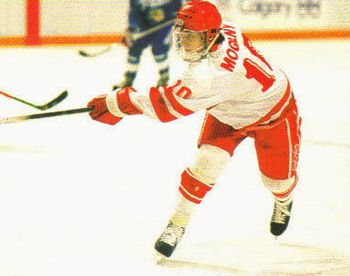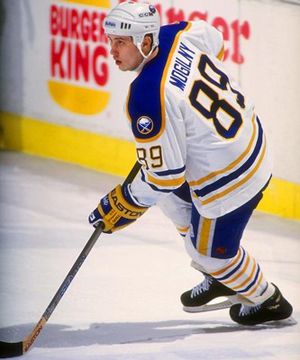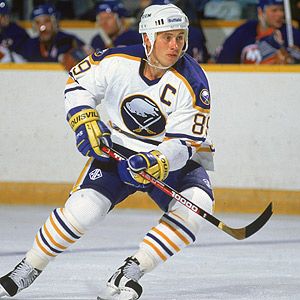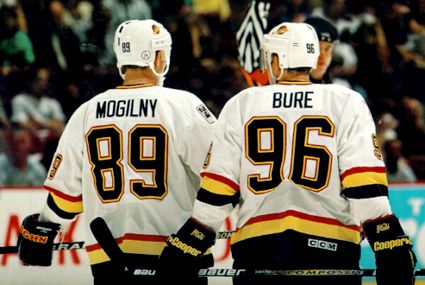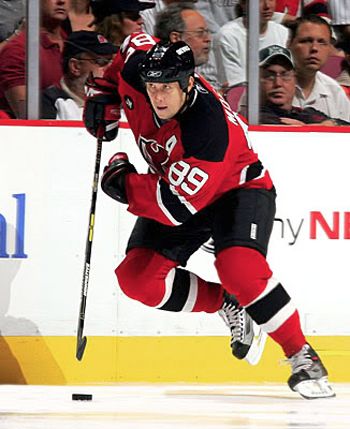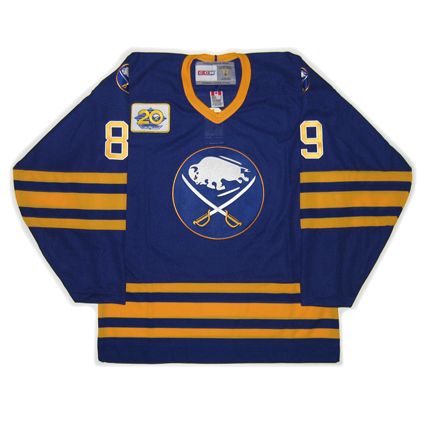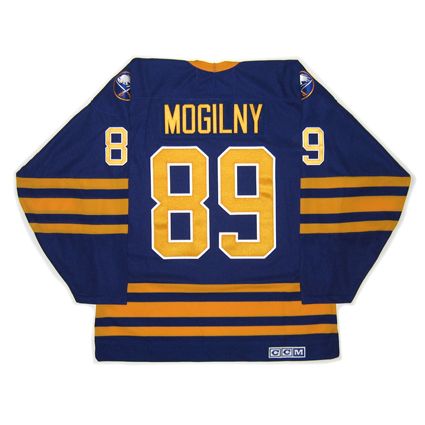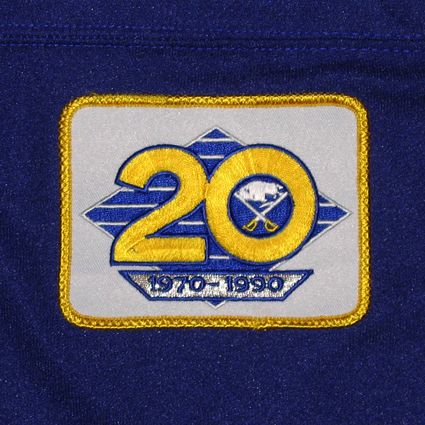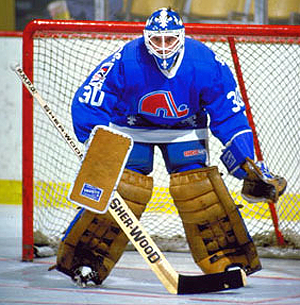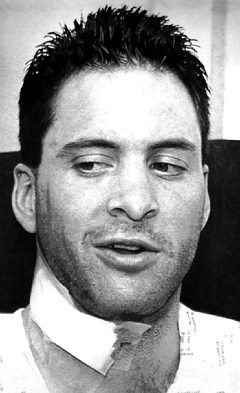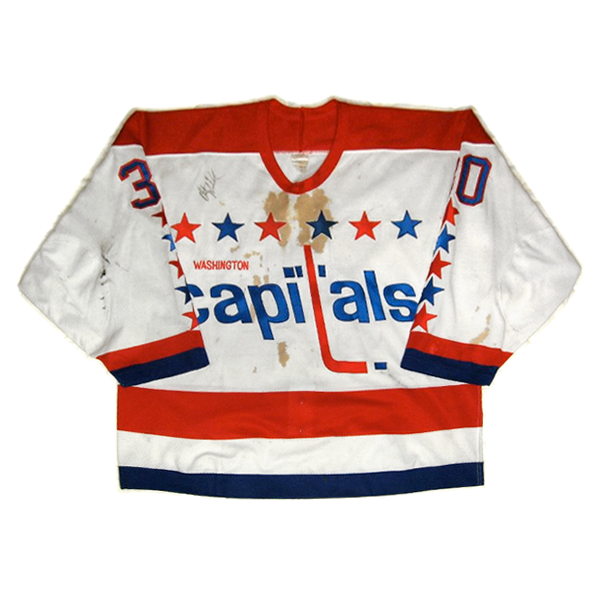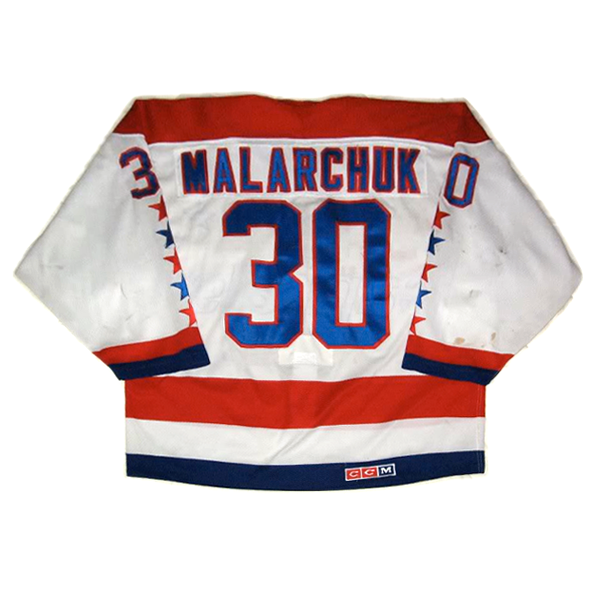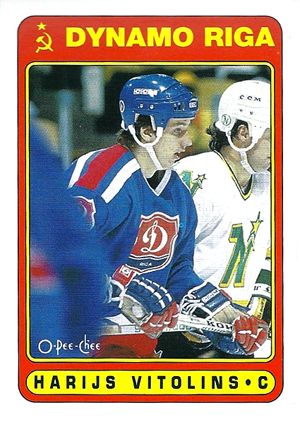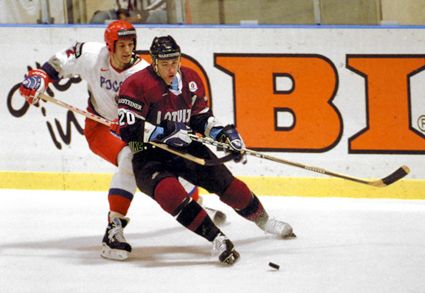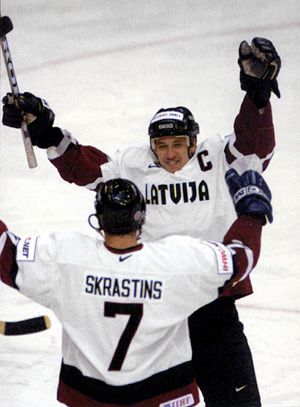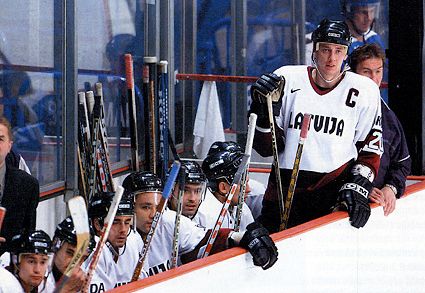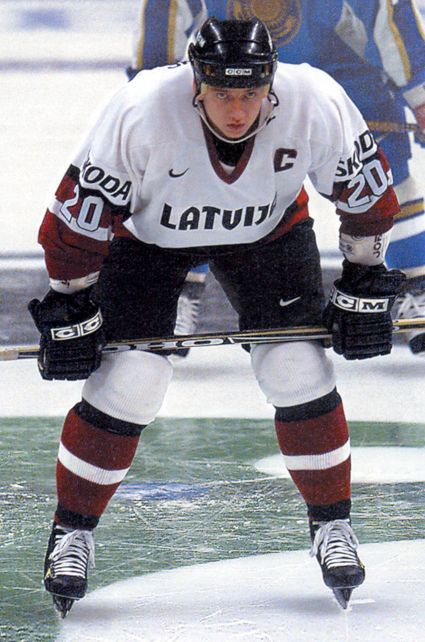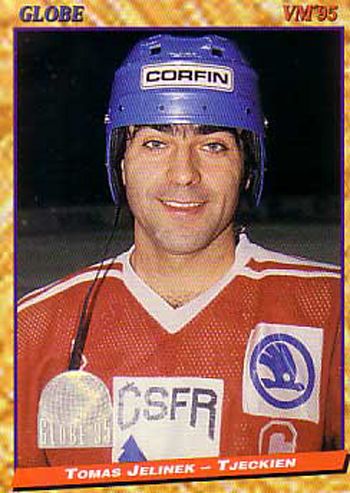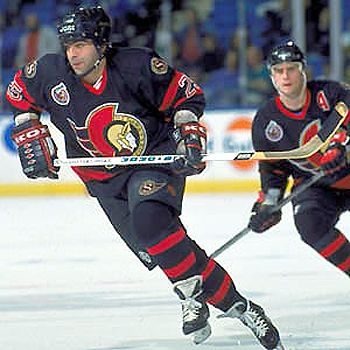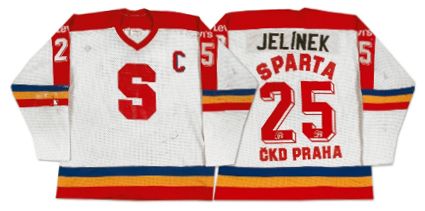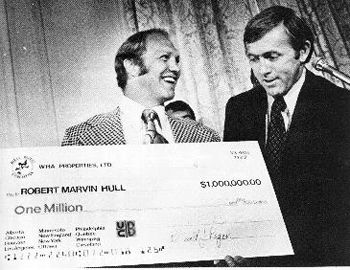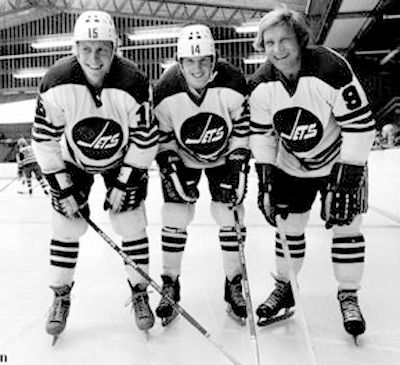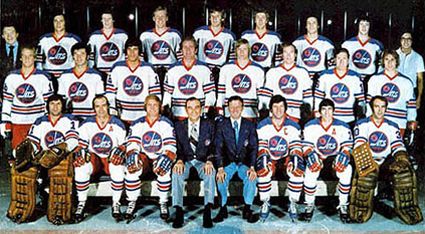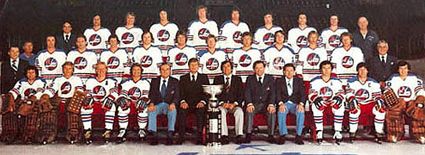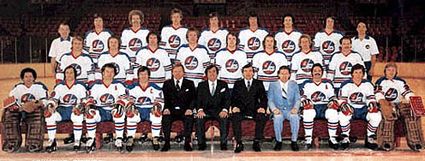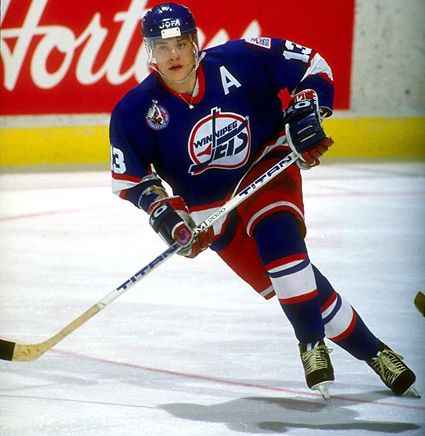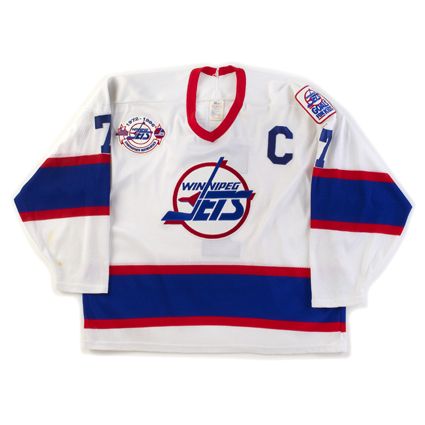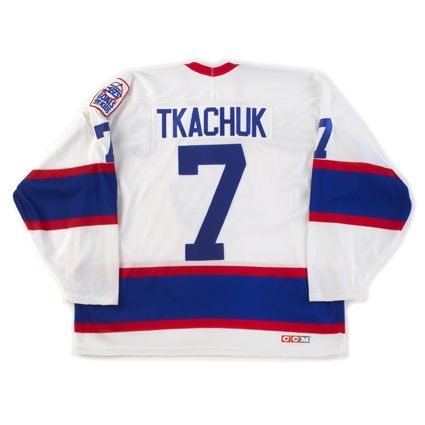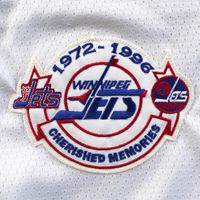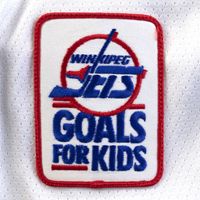After five seasons of diminishing point totals in Vancouver, from 107 to 73, then 45 twice, he was dealt to the New Jersey Devils late in the 1999-00 season, having previously enjoyed the most minimal playoff success to that point in his career, having only escaped the first round once in ten seasons.
Friday, May 2, 2014
1989-90 Buffalo Sabres Alexander Mogilny Jersey
On this date in 1989, Alexander Mogliny, then just 20 years old, made a choice that would affect the rest of his life.
In today's video section, an interview with Mogliny from the 1989 World Junior Championships in January, a few months prior to his defection in April after the World Championships. He sticks to the party line quite well, giving little hint as to what was to follow, or at least that's what the interpreter tell us...
While in Stockholm, Sweden, having just completed winning a gold medal at the 1989 World Championships, Mogilny made the life changing decision to become the first Soviet player to defect, leaving behind his family but escaping the totalitarian rule of the communist system, and iron-fisted Soviet old school coach Viktor Tikhonov in particular, whom Mogilny felt would make his life not only at the rink, but outside of hockey, miserable for years to come due to his independent nature.
The story begins at the 1988 NHL Entry Draft when the Sabres, with one of their two picks in the fifth round, selected one of the most exciting young players in the world, Alexander Mogilny with the 89th overall pick. While many Soviet players had been chosen in the NHL draft before, it was generally in much later rounds when taking a flyer on a player unlikely to ever appear in an NHL game was worth the roll of the dice with an essentially meaningless pick.
Gerry Mehan, the Sabres general manager explains, "I would never have used the draft pick if I didn’t think he would be coming,” Meehan said. “The attitude then was, ‘There’s no way this guy is going to come out. He’s too big a young star.’ It was my view that it was inevitable that, sooner or later, the Russians were going to have to let their players come and play on a world stage other than the Olympics and the World Championship.”
At the beginning of 1989, former Sabre Don Luce, the club's Director of Amateur Evaluation, travelled to Anchorage, Alaska to to 1989 World Junior Tournament. There, Mogilny and linemate Pavel Bure, along with Sergei Fedorov, were finishing third and fourth in tournament scoring while leading the Soviets to a 6-1 record and the gold medal. Luce met briefly with Mogilny in Anchorage and gave him a business card, cementing Mogilny's decision to defect at the first opportunity.
That opportunity arrived four months later when the Soviets were given two days in Stockholm after winning the 1989 World Championship. Luce, at home in North America, received a phone call on this date in 1989 from a man who claimed to be Mogilny's agent, Sergei Fomitchev. Unsure if he was really in contact with Mogilny, he asked Fomitchev to have Mogilny repeat what he had said to him in Anchorage. Told then that he had not played very well, Mogilny had stated "I show you next game", prior to scoring a hat trick against Canada to clinch the gold medal.
After Mogilny repeated the phrase, Luce and Meehan were on a plane to Sweden three hours later, arriving midday on May 3rd. While waiting for Fomitchev to return from shopping, the got an urgent call saying Mogilny's defection had to happen right away because it would be his best opportunity to get away.
They met at a mall and drove off. The next two days were spent moving from hotel to hotel to avoid being found while Meehan worked with the U. S. Embassy to arrange the necessary paperwork.
At one point Mogilny, from the far eastern part of Russia where few players have originated from, attempted to call home and midway through the conversation the call was disconnected, giving rise to Mogilny's fears that the call had been traced and the authorities knew where they were.
The day they left they abandoned their rental car and took a taxi to the airport, and once inside the security gates, their fears of the Soviet officials was over. Meehan remembers, “He asked me in his broken English, ‘Am I free now?’ " And I said, ‘Yeah, you’re free.’ And he went over and had a beer. He couldn’t believe it. He said ‘free’, he didn’t say ‘safe’. He said ‘free’. I found that to be kind of poignant.”
Fedorov defected less than a year later at the 1990 Goodwill Games in Seattle and shortly afterwards the Iron Curtain fell and Bure joined the NHL without having to defect.
During his rookie season in the NHL, wearing he number 89 presented to him by the Sabres owner Seymour H. Knox III in recognition of his place in the draft and year of his defection, Mogilny would play 65 games, scoring 15 goals and 43 points as he became acclimated to living in North America and learning a new language and culture. "It was a huge adjustment to come to the NHL. The language barrier was the toughest part. Lack of communication affected me both on and off the ice. It also took some time to get used tot he airline travel. I had to deal with a fear of flying," Mogilny recalled.
He would double his goal total the following season to reach 30 for the first time.
The arrival of Pat Lafontaine in Buffalo would give Mogilny a world class teammate to work with and his point totals took another jump upwards, finishing 1991-92 with 39 goals and 84 points and became the first Russian on an NHL All-Star Team. Given a year to work together and now fully integrated into life in the United States and the NHL, Mogilny had one of the greatest seasons in league history in 1992-93. He would score 127 points from 51 assists and a remarkable 76 goals in 77 games. His 76 goals remain tied for fifth all-time in a single season with Teemu Selanne and Phil Esposito.
With Lafontaine limited to just 38 games over the next two seasons, Mogilny was named team captain in his absence, the first European to ever captain an NHL club, but his production suffered as a result of the missing Lafontaine.
After five seasons of diminishing point totals in Vancouver, from 107 to 73, then 45 twice, he was dealt to the New Jersey Devils late in the 1999-00 season, having previously enjoyed the most minimal playoff success to that point in his career, having only escaped the first round once in ten seasons.
Mogilny as captain of the Sabres
He was then traded to the Vancouver Canucks and reunited with Bure for the 1995-96 season, in which he would score 55 goals and 107 points, the second highest of his career in both categories.
The Russian duo of Mogilny and Bure reunited in Vancouver
After five seasons of diminishing point totals in Vancouver, from 107 to 73, then 45 twice, he was dealt to the New Jersey Devils late in the 1999-00 season, having previously enjoyed the most minimal playoff success to that point in his career, having only escaped the first round once in ten seasons.
Prior to leaving the Soviet Union, Mogilny had already, just ten days after his 19th birthday, won a gold medal at the 1988 Olympics and then added he World Championship gold just days before his defection. Now with the Devils, Mogilny would see his first extended playoff run, which would evetnually lead to a Stanley Cup championship. When he won the Stanley Cup with the New Jersey Devils, he became just the ninth player in history to join the Triple Gold Club.
The move to New Jersey was a positive one for Mogilny, as he would regain his scoring touch and exceed 40 goals for only the third time in his career, with 43 goals during an 83 point season and another run to the Stanley Cup Finals.
He would sign with the Toronto Maple Leafs for the 2001-02 season, where he would play for three seasons, including winning the Lady Byng Trophy in 2003 and scoring his 1,000th point in 2003-04, before returning to the Devils for the final season of his career in 2005-06 before retiring with 473 goals and 1032 points in 990 games.
Following his defection, Mogilny would never play for the Soviet Union again and suit up for Russia just once in the 1996 World Cup of Hockey, cutting short what was destined to be a fine, if not outstanding, international career.
When asked following his career about the reasons for his defection, Mogilny responded, “Why did I do it? I did it for freedom. If the bird can fly and the fish can swim, you have to be able to move around the world and be free and not watched constantly. If a human being doesn’t have freedom, that’s not life. It’s like living in a cage. To me, you might as well be dead.”
Today's jersey is a 1989-90 Buffalo Sabres Alexander Mogilny jersey. This jersey features the Sabres 20th Anniversary patch worn in Mogilny's rookie season following his defection earlier that year.
This jersey also sports Mogilny's distinctive #89, which is based on the year of his defection from the Soviet Union.
Here is a look at the some of the career highlights of Alexander Mogilny.
Here, Mogilny scores his 70th goal of the 1992-93 season, only the seventh player to reach 70 in NHL history.
Speaking of the remarkable 1992-93 season, here is a brief feature story on the partnership between Mogilny and Lafontaine.
Labels:
Buffalo Sabres,
Mogilny Alexander
Thursday, May 1, 2014
1988-89 Washington Capitals Clint Malarchuk Jersey
Born on this day in 1961, Clint Malarchuk was originally drafted by the Quebec Nordiques #74 overall in the 1981 NHL Entry Draft and spent the majority of the season in the American Hockey League but did make his NHL debut with a pair of appearances with the Nordiques in 1981-82.
He would again spend most of his time in the AHL in 1982-83, but did earn his first NHL victory in 15 games with the Nordiques, posting an 8-5-2 record. The following season he again split time between the AHL and the Nordiques, only this time with the majority of games spent in the NHL, again finishing the season with a winning record of 10-9-2.
Malarchuk played all of 1984-85 with the Fredericton Express in the AHL before becoming a full time NHLer in 1985-86, seeing action in 46 games in Quebec, going 26-12-4. After one more season with the Nordiques, and appearing in a career high 54 games, Malarchuk was traded to the Washington Capitals as part of the deal which brought Dale Hunter to the Capitals.
As the Capitals number one netminder, he matched his career high with 54 games, winning 24 of them and leading the NHL in shutouts with 4. He made it into 42 games with the Capitals in 1988-89 before being traded on March 7th to the Buffalo Sabres who sent Calle Johansson to Washington.
15 days later Malarchuk would suffer a grotesque injury when his throat was slashed by a skate during a game, causing a ghastly scene on the ice as he bled profusely from a severed carotid artery and feared for his life. Sabres trainer Jim Pizzutelli, a former army medic in Vietnam, rushed to his aid to control the bleeding until doctors arrived, saving Malarchuk's life.
It took doctors 90 minutes and 300 stitches to close the horrific wound, but Malarchuk would spend just one night in the hospital. Two days later he made an appearance at a Sabres game, receiving a two minute standing ovation. Incredibly, four days after the accident he would return to practice and a week later he played for the last five minutes of the final game of the regular season.
It took doctors 90 minutes and 300 stitches to close the horrific wound, but Malarchuk would spend just one night in the hospital. Two days later he made an appearance at a Sabres game, receiving a two minute standing ovation. Incredibly, four days after the accident he would return to practice and a week later he played for the last five minutes of the final game of the regular season.
The following season he would play 29 games, going 14-11-2. An increase in games to 37 preceded his last season in the NHL, as he saw action in 29 games as he again split time with Darren Puppa.
Following the conclusion of his NHL career, Malarchuk would play three seasons in the IHL, first with the San Diego Gulls, followed by two with the Las Vegas Thunder, highlighted by going 34-10-7 in 54 games in 1993-94. He would get into 1 game in 1995-96 and three the following season while the assistant general manage and coach to conclude his playing career. His #30 would be the first number retired by the Thunder.
While in Las Vegas, Malarchuk, known for his wacky sense of humor, pulled one of our favorite pranks ever. He told a reporter that he spoke fluent Czech and proceeded to translate the reporter's questions to then 18 year old Radek Bonk, as well as Bonk's replies. The problem was, Malarchuk didn't actually know a single word of Czech, and was speaking gibberish to Bonk, who struggled to keep a straight face throughout!
Today's featured jersey is a 1988-89 Washington Capitals Clint Malarchuk jersey, from his second season in Washington D. C.
This jersey features the five stars down the sleeves, which the Capitals jerseys had from 1974-75 until 1982-83 until going to just four stars for two seasons until reverting back to five again for the 1985-86 season.
The Capitals wore these jerseys from their inception in 1974 all the way through the 1994-95 season.
What really sets the authentic version of the Capitals jersey apart from the replica jerseys is that each letter of the Capitals logo on the front is a separate piece of material, rather than the entire crest being embroidered in a smaller size onto a patch, which would then be sewn onto the jersey. Each of the 16 stars on the chest and sleeves are also separate pieces of material which are sewn on. If you can get an old game worn or authentic Capitals jersey, do so, as it is one of the largest differences in quality between the authentic and the replica of any jersey.
What really sets the authentic version of the Capitals jersey apart from the replica jerseys is that each letter of the Capitals logo on the front is a separate piece of material, rather than the entire crest being embroidered in a smaller size onto a patch, which would then be sewn onto the jersey. Each of the 16 stars on the chest and sleeves are also separate pieces of material which are sewn on. If you can get an old game worn or authentic Capitals jersey, do so, as it is one of the largest differences in quality between the authentic and the replica of any jersey.
Today's video section begins with an interview with Malarchuk shortly after his injury. You have to just shake your head at the part where he says "it's part of the game."
Here is Malarchuk having a full on slugfest with Troy Gamble and then discussing the fight and his subsequent suspension while playing for the Las Vegas Thunder.
Labels:
Malarchuk Clint,
Washington Capitals
Wednesday, April 30, 2014
1999 Latvia National Team Harijs Vītoliņš Jersey
Born on this date in 1968 in Riga, Latvia while it was a part of the Soviet Union, Harijs Vītoliņš worked his way up from the third division of the Soviet hockey ladder, eventually joining Riga's entry in the Soviet Hockey League, Dinamo Riga for two games of the 1986-87 season, where, in 17 games the center scored his first top level goal as well as an assist.
He played a further 30 games in 1987-88, upping his point totals to 3 goals and 3 assists. While not an offensive force, his steady and reliable style of play garnered him the right sort of attention, which earned him a place on the Soviet Union National Team at the 1988 World Junior Championships where he earned a silver medal. The exposure on the world stage led to Vītoliņš being drafted that spring by the Montreal Canadiens in the ninth round of the 1988 NHL Entry Draft despite Soviet players not being allowed to leave for the NHL at the time.
In 1988-89 he competed for Dinamo Riga in the Soviet League again, as well as making the trip to North America as part of Dinamo's part in the Super Series, where Soviet club teams played a series of exhibition games against NHL clubs. In the seven games of the 1989 Super Series, Dinamo tied the Calgary Flames, lost to the Edmonton Oilers and Vancouver Canucks before defeating the Los Angeles Kings. They then lost to both the Chicago Blackhawks and St. Louis Blues prior to downing the Minnesota North Stars to conclude their tour of North America.
Vītoliņš playing for Dinamo Riga against Minnesota
during their 1989 tour of North America
The next two seasons saw Vītoliņš set highs with first 45 and then 46 games played as well as raising his offensive contributions to 7 goals and 13 points in 1989-90 and then a leap up to 12 goals and 31 points as his role with the team evolved.
Changes in the political world saw the breakup of the Soviet Union in December of 1991, which sent ripples through the world of hockey, one of which resulted in the club changing their name to the Stars Riga for the 1991-92 campaign, during which he contributed another 12 goals.
With players now free to seek their own way, Vītoliņš had a hectic, unsettled season, playing for the Beast of New Haven in the American Hockey League, The Thunder Bay Thunder Hawks of the Colonial Hockey League, both in North America prior to joining EHC Chur of the Swiss National League A, all in 1992-93. In all, he totaled 24 goals in 32 games between the three clubs. More importantly, Latvia was now once again an independent country and their national had been reformed for the first time since 1939 when they became a part of the Soviet Union.
As one of the new member nations of the International Ice Hockey Federation, Latvia was placed in the third tier of the World Championship program in what was then known as the "C" Pool. The process of sorting out the many new member nations saw Latvia required to play a Qualifying Round against neighbors Estonia and Lithuania, who they easily defeated 6-3 and 13-2 to qualify for the main "C" Pool tournament.
In March of 1993 they travelled to Bled, Slovenia for Group 1 play where they annihilated Belgium 26-3, shut out North Korea 4-0, embarrassed Israel 32-0, tied Ukraine 5-5 and hammered South Korea 27-0. Those dominant wins resulted in both Latvia and Ukraine advancing to the "C" Pool semifinals where they would face Slovenia from Group 2, who they defeated easily 5-1, setting up a rematch with Ukraine, who had eliminated Kazakhstan 3-2.
The deciding game of the "C" Pool was played on March 21, 1993 which saw Latvia achieve their goal with a 2-0 win, earning immediate promotion to the "B" Pool in their first try, setting off celebrations among their rabid fans.
Vītoliņš was once again selected in the NHL draft, this time by the Winnipeg Jets, who assigned him to the Moncton Hawks of the AHL, where he set new career highs with 28 goals and 62 points. His play earned him a call up to the NHL with the Jets, with whom he played 8 games, although he did not register a point.
He returned to Switzerland for the 1994-95 season with SC Rapperswil-Jona as well as skating for Lativa once more at the 1994 World Championships in the "B" Pool, where they made a strong showing with a 18-1 win over Romania, 6-1 over the Netherlands, 9-2 over Denmark, a vital 4-3 loss to Slovakia followed by wins over Poland 6-2, Japan 15-2 and Great Britain 8-4. Their loss to Slovakia forced them to remain in the "B" Pool for yet another year following coming up a goal short against Switzerland on the final day of the 1994 championships while Vītoliņš was away in North America.
For 1995-96 it was off to Sweden, where Vītoliņš joined Rögle BK for the Swedish domestic season in advance of the 1996 World Championships. They opened their schedule with a narrow 6-5 win over Great Britain, and then got on a roll with a 6-1 victory over Japan, took care of business 5-3 over Denmark, took an important step with a 4-1 against Belarus, got past Poland 4-2, hammered the Netherlands 15-3, which set up a critical final game against Switzerland, who put themselves in a hole with an opening day loss to Belarus. Leading in the standings by two points, Latvia got their desired result with a 1-1 tie, securing first place in the "B" Pool, which earned them a promotion to the "A" Pool, joining the world's elite in only their fourth year after the reformation of their national team after over 50 years, once again triggering euphoria among their reknowned fan base.
Vītoliņš played the next five seasons with EHC Chur, the first four of which were in the second division National League B before earning promotion to the National League A. His offensive game flourished with Chur, averaging 24 goals a year with a high of 30 in 1997-98 as well as a career best 83 points in 1996-97 from just 36 games played.
He also played annually for Latvia at the World Championships each spring, having risen to the role of national team captain and helping Latvia defend it's place in the Top Division each time, with a best of 7th place in 1997, which remains the highest placing in the history of Latvia, which they equalled in 2004 and 2009.
Vītoliņš during the 1998 World Championships
The highlight for Latvia during this time period was undoubtedly their emotional victory over Russia at the 2000 World Championships, defeating Russia on an even playing field for the first time.
Vītoliņš celebrates with the late Karlis Skrastins
The 2001-02 season saw Vītoliņš join HC Thurgau in the National League B for four seasons, which included tying his career best with 30 goals in 2003-04.
He concluded his international career in fine style, first at the 2002 Olympics, where he was awarded the honor of being the flag bearer for Latvia in the opening ceremonies. In Salt Lake City, Vītoliņš would score 2 goals and 4 points in 4 games, but Latvia failed to advance past the Preliminary Round, as they were lacking their better players, who were not available due to still being obligated to their NHL teams at the time. The NHL did not begin it's Olympic break until the start of the First Round, which resulted in changes to the schedule for subsequent games.
Latvia team captain Vītoliņš
Vītoliņš' final participation for Latvia came later in the spring of 2002, when he skated in his ninth World Championships, which included scoring his 19th goal for the National Team.
His career would wind down in the 2004-05 season after 18 games for Thurgau in the NLB and one each for Langnau and Ambri-Piotta of the NLA.
Vītoliņš would continue to remain active in hockey, becoming an assistant coach for Latvia at the 2005 World Championships and has remained there through 2011. He was also part of Latvia's efforts at the 2006 and 2010 Olympics and most recently was a part of Dynamo Moscow's staff during their KHL Gagarin Cup championships in 2012 and 2013 as an assistant and was recently promoted to be their new head coach for the upcoming 2014-15 season.
Today's featured jersey is a 1999 Latvia National Team Harijs Vītoliņš jersey. Latvia joined the ranks of international hockey in 1993 with blue jerseys with red and white trim for three years before completely revamping their jerseys with the arrival of Nike as the jersey supplier to the IIHF in 1996.
The new jerseys were maroon, which reflected the main color of the flag of Latvia, with black and white striping. The cresting was a simple "LATVIJA" in a stylized font and remained essentially unchanged until a new design arrived in time for the 2005 World Championships when all the teams jerseys were revisited.
Today's video section begins with Vītoliņš scoring in the 2000 World Championships in a 2-1 Lativan win over Ukraine.
Next, highlights of the Latvia National Hockey Team, including footage from their dramatic win over Russia at the 2000 World Championships, the highlight of the program, as well as a glimpse of their loyal fans.
Labels:
Latvia,
Vītoliņš Harijs
Tuesday, April 29, 2014
1987-88 Sparta Prague Tomáš Jelínek Jersey
Born in Prague, Czechoslovakia on this date in 1962, Tomáš Jelínek first played in the Czech First Ice Hockey League with 7 games during the 1979-80 season. The right wing also made his international debut for Czechoslovakia at the 1980 European Junior Championships.
The following season he moved to Dukla Trencin playing 34 games, scoring 5 goals and 11 points as well as playing in the World Junior Championships where he scored 3 goals in 5 games. He was back with Trencin for 1981-82, this time scoring 9 goals in 36 games as well as playing in his second World Juniors where he earned a silver medal.
He rejoined Sparta Prague in 1982-83 where he had his first 20 goal season with exactly 20 as well as 25 assists for 45 points in 40 games. Jelínek would play another six seasons for Sparta through the 1988-89 season, the season he also made his debut at the World Championships, scoring once in 5 games as the Czechs came home with the bronze.
For 1989-90, Jelínek became a member of České Budějovice where he was given a larger offensive role than he had with Prague over the last six years, as he immediately set a new career high with 23 goals on his way to a 43 point season. Following the season he participated in his second consecutive World Championships for Czechoslovakia, earning another bronze.
Jelínek would then set a career best with 24 goals in 1990-91 with Budějovice.
Prior to the start of the 1991-92 season, Jelínek was a member of the Czech team at the 1991 Canada Cup tournament, where he scored 5 points in 5 games.
Jelínek was not only with a new team in 1991-92, but for the first time was playing outside Czechoslovakia when he joined HPK Hämeenlinna of Finland's SM-Liiga where he matched his previous season with an identical 24 goals and 23 assists for 47 points, only in ten less games than the previous season.
It was also a busy season for Jelínek on the international scene, as he first made his Olympic debut in style at the 1992 Games in Albertville, France as the team Captain, scoring 3 goals and 5 points in 8 games as the Czechs finished with the bronze medal. Later that spring, Jelínek, again as the Czech captain, won his third World Championships bronze out of three tries, as he contributed 9 points in 8 games from 4 goals and 5 assists in the final World Championships for Czechoslovakia, as the country would divide into the Czech Republic and Slovakia at the end of the year.
His fine play over the last two seasons, as well as the exposure gained at the Canada Cup and Olympics led to Jelínek being drafted by the expansion Ottawa Senators of the NHL and coming to North America for the Senators inaugural season. Jelínek played 49 games with Ottawa, scoring 7 goals and 13 points in his only NHL season.
In 1992-93, he played two games with the Prince Edward Island Senators of the AHL before a return to Europe saw him play 6 games with his original club Sparta Praha and then 8 with the Zürich SC Lions in Switzerland.
He was back to full time duty in the Czech Extraliga in 1994-95, playing a full season with Slavia Praha, scoring 28 points in 44 games.
Jelínek would spend the next three seasons with HC Plzen, highlighted by first a 44 point season in 1995-96 and then setting a career best with a 48 point season, as well as his fifth and final 20 goal season with 22.
After playing 14 games with Plzen to begin the 1997-98 season, Jelínek would return to Sparta Praha for remainder of the season, scoring 23 points in 37 games as well as establishing another career high, this one for penalty minutes with 144, easily topping his previous high of 102 back in 1991.
After one final game with Sparta at the start of 1998-99, Jelínek first played 7 games with Slezan Opava, then 19 games with HC Vitkovice before then finally joining his fourth team of the season when he took to the ice for EV Weiden of the German second division, ending his career with 10 goals and 26 points in 14 games.
Today's featured jersey is a 1987-88 Sparta Prague Tomáš Jelínek jersey as worn on his return to the Czech Republic after two seasons playing in Finland and Canada.
Sparta Prague was an athletic association founded in 1893, first playing bandy in 1903. Their original hockey team was formed in 1909, making them as old as the Montreal Canadiens and older than every other team in the NHL.
They won two Czech titles in 1953 and 1954 as well as back to back Spengler Cups in 1962 and 1963. They later would win the Czech Extraliga title in 2000 and again in 2002 before a unexpected playoff run in 2006 led to a third title in recent times, quickly followed by a fourth in 2007.
Today's video is a look at Sparta Prague in modern times.
The following season he moved to Dukla Trencin playing 34 games, scoring 5 goals and 11 points as well as playing in the World Junior Championships where he scored 3 goals in 5 games. He was back with Trencin for 1981-82, this time scoring 9 goals in 36 games as well as playing in his second World Juniors where he earned a silver medal.
He rejoined Sparta Prague in 1982-83 where he had his first 20 goal season with exactly 20 as well as 25 assists for 45 points in 40 games. Jelínek would play another six seasons for Sparta through the 1988-89 season, the season he also made his debut at the World Championships, scoring once in 5 games as the Czechs came home with the bronze.
For 1989-90, Jelínek became a member of České Budějovice where he was given a larger offensive role than he had with Prague over the last six years, as he immediately set a new career high with 23 goals on his way to a 43 point season. Following the season he participated in his second consecutive World Championships for Czechoslovakia, earning another bronze.
Jelínek would then set a career best with 24 goals in 1990-91 with Budějovice.
Prior to the start of the 1991-92 season, Jelínek was a member of the Czech team at the 1991 Canada Cup tournament, where he scored 5 points in 5 games.
Jelínek was not only with a new team in 1991-92, but for the first time was playing outside Czechoslovakia when he joined HPK Hämeenlinna of Finland's SM-Liiga where he matched his previous season with an identical 24 goals and 23 assists for 47 points, only in ten less games than the previous season.
It was also a busy season for Jelínek on the international scene, as he first made his Olympic debut in style at the 1992 Games in Albertville, France as the team Captain, scoring 3 goals and 5 points in 8 games as the Czechs finished with the bronze medal. Later that spring, Jelínek, again as the Czech captain, won his third World Championships bronze out of three tries, as he contributed 9 points in 8 games from 4 goals and 5 assists in the final World Championships for Czechoslovakia, as the country would divide into the Czech Republic and Slovakia at the end of the year.
Team captain Jelínek in the final jersey style for Czechoslovakia
His fine play over the last two seasons, as well as the exposure gained at the Canada Cup and Olympics led to Jelínek being drafted by the expansion Ottawa Senators of the NHL and coming to North America for the Senators inaugural season. Jelínek played 49 games with Ottawa, scoring 7 goals and 13 points in his only NHL season.
Jelínek in the original Senators jersey style
In 1992-93, he played two games with the Prince Edward Island Senators of the AHL before a return to Europe saw him play 6 games with his original club Sparta Praha and then 8 with the Zürich SC Lions in Switzerland.
He was back to full time duty in the Czech Extraliga in 1994-95, playing a full season with Slavia Praha, scoring 28 points in 44 games.
Jelínek would spend the next three seasons with HC Plzen, highlighted by first a 44 point season in 1995-96 and then setting a career best with a 48 point season, as well as his fifth and final 20 goal season with 22.
After playing 14 games with Plzen to begin the 1997-98 season, Jelínek would return to Sparta Praha for remainder of the season, scoring 23 points in 37 games as well as establishing another career high, this one for penalty minutes with 144, easily topping his previous high of 102 back in 1991.
After one final game with Sparta at the start of 1998-99, Jelínek first played 7 games with Slezan Opava, then 19 games with HC Vitkovice before then finally joining his fourth team of the season when he took to the ice for EV Weiden of the German second division, ending his career with 10 goals and 26 points in 14 games.
Today's featured jersey is a 1987-88 Sparta Prague Tomáš Jelínek jersey as worn on his return to the Czech Republic after two seasons playing in Finland and Canada.
Sparta Prague was an athletic association founded in 1893, first playing bandy in 1903. Their original hockey team was formed in 1909, making them as old as the Montreal Canadiens and older than every other team in the NHL.
They won two Czech titles in 1953 and 1954 as well as back to back Spengler Cups in 1962 and 1963. They later would win the Czech Extraliga title in 2000 and again in 2002 before a unexpected playoff run in 2006 led to a third title in recent times, quickly followed by a fourth in 2007.
Today's video is a look at Sparta Prague in modern times.
Labels:
Jelínek Tomáš,
Sparta Prague
Monday, April 28, 2014
1995-96 Winnipeg Jets Keith Tkachuk Jersey
The late, great original Winnipeg Jets were formed in 1972 as one of the founding teams of the World Hockey Association, which brought professional hockey to several Canadian cities, including Winnipeg, Ottawa, Quebec City, Edmonton and later Toronto, Vancouver and Calgary.
The Jets would make the biggest splash in the league by luring away Bobby Hull from the NHL's Chicago Black Hawks for the unheard of sum of $1,000,000, putting the fledgling league on the map.
Their first season of 1972-73 saw them finish first in the Western Division and make it all the way to the Avco Cup Finals where they would fall to the New England Whalers. While they would fail to qualify for the playoffs the next two seasons, they would set themselves up to be one of the most exciting teams in all of hockey for the next four years by signing Swedes Anders Hedberg and Ulf Nilsson.
The duo, paired with Hull, would electrify the franchise as they finished second, fourth and seventh in league scoring in just their first season together as Hull set a new professional record with 77 goals, although the club failed to qualify for the playoffs.
1975-76 was the season it all came together for the Jets. They tied the Houston Aeros for the most points in the league with 106 as Hull, Nilsson and Hedberg finished second, third and seventh in league scoring. Once in the playoffs they cruised through the Edmonton Oilers 4-0, the Calgary Cowboys 4-1 and swept the Aeros in the finals in four straight to capture their first WHA championship.
While Hull only played in 34 games in 1976-77, Hedberg led the league in goals with 70 as he and Nilsson came two-three in the scoring race. The Jets returned to the Avco Cup Finals but fell to the Quebec Nordiques in seven games.
Hull returned to full-time duty in 1977-78 and the dynamic trio finished with Nilsson, Hedberg and Hull 2-3-4 in scoring, with teammate Kent Nilsson eighth. The Jets finished atop the league standings and defeated the Birmingham Bulls and New England Whalers to take home the championship for the second time.
1978-79 was one of change for the Jets, as Hull would only compete in four games and Hedberg and Nilsson would defect for the bright lights of Broadway when they signed to play for the New York Rangers of the NHL.
Still, the remainder of the Jets would pull through, coming in third in the regular season standings in the final WHA season, but defeat both the Nordiques and then the Oilers to win their second consecutive Avco Cup and their third overall as they went to the league finals for the fifth time in seven seasons.
The Jets, along with New England (Hartford), Edmonton and Quebec were admitted into the NHL for the 1979-80 season, but at a steep price. The restrictive rules placed on the renegade clubs joining the NHL saw the Jets required to relinquish leading scorer Kent Nilsson, Terry Ruskowski (4th in scoring) and Rich Preston (6th). In addition, leading scorer among defensmen Barry Long was also gone from the roster. Forced to draft 18th out of 21, the Jets would finish dead last in the NHL for the next two seasons.
Acquiring Dale Hawerchuk in the 1981 draft started the Jets back on the road to respectability. Eventually the Jets would claim fourth overall in the league in 1984-85, but were doomed by finding themselves in the same division with league powerhouses Edmonton and the Calgary Flames. With the current divisional playoff format of the time, the Jets were forced to face the Oilers at the height of their dynasty no less than six times in the eight seasons between 1983 and 1990, losing each and every series while winning a total of only four games as the Oilers went on to win five Stanley Cups and the Flames one during that time period.
While the Jets playoff success in the NHL was derailed by the Oilers dynasty, one enduring memory is the "White Out", which arrived in the 1987 playoffs when the Jets asked fans to wear white to home playoff games in response to the Flames "C of Red". Following their four game sweep of Calgary that season, a tradition was born which the franchise continues to employ to this day.
While they were a competitive club on the ice, it became increasingly difficult for the Jets to compete financially, being the fourth smallest market in the NHL (pop. 675,000 and about the size as Omaha, Nebraska), and hampered by playing in the Winnipeg Arena which opened in 1955 and lacked the modern amenities such as luxury boxes and club seating required to keep pace in the modern sports landscape.
They tried to remain competitive, including trading Hawerchuk to Buffalo in 1990 for Phil Housley, Scott Arniel, Jeff Parker and a draft pick which would become Keith Tkachuk.
1992-93 saw the arrival of Russian Alexi Zhamnov, the bruising Tie Domi and the dynamic Finn Teemu Selanne, who would electrify the city with 76 goals as a rookie.
Still, playoff success eluded the Jets and they slipped in the standings, completely missing out on the playoffs in 1994 and 1995.
With the weaker Canadian dollar of the day hurting the franchise financially, eventually the push for a new arena began, which was eventually unsuccessful, making the owners of the club willing to sell the team they viewed as inviable. When it proved impossible to find a local buyer, the owners announced their intention in May of 1995 to sell the club to buyers from outside of Winnipeg, who would inevitably move the team.
The fans of Winnipeg rallied in a way never seen before or since. The "Save the Jets" rally at The Forks on May 16, 1995 drew over 35,000 people in an effort to raise funds to purchase the franchise. While an astonishing outpouring generated a reported $13 million, it fell far short of the over $110 million required and it was announced on October 18, 1995 that the team had been sold to Americans Richard Burke and Steven Gluckstern, who had originally hoped to move the club to the Twin Cities of Minneapolis and St. Paul, Minnesota, and with the Jets eventually landing in the most unlikely of places, in the desert of Phoenix, Arizona.
Still, the Jets would play one final season in Winnipeg before any relocation was to happen. Morale among the fans only deteriorated further when Selanne, who won over the hearts of Winnipeggers with his scoring exploits and personality is sent to the Mighty Ducks of Anaheim in February of 1996 in a salary dump. For a city about to lose it's franchise, having it's most beloved player since Bobby Hull miss the going away party was a real kick in the stomach.
A rise in the standings in 1995-96 saw the lame duck Jets qualify for the playoffs on the final day of the season to put the moving vans on hold for as long as the team could last in the postseason. Paired against the Red Wings in the playoffs, Detroit took the first to games at home while the Jets responded by winning Game 3 at home. Detroit then won at Winnipeg to put the Jets on the brink, but they staved off elimination with a 3-1 win in Detroit to return home to Winnipeg, but the end came for the Jets with a 4-1 loss in their final game on this date in 1996.
Today's featured jersey is a 1995-96 Winnipeg Jets Keith Tkachuk jersey as worn in the final game in Jets history, a loss at home which eliminated the Jets from the playoffs for a final time. This jersey features the Cherished Memories worn during the final ten games in Jets history plus their playoff series versus Detroit. There was also a blue version worn on the road jerseys.
Tkachuk wore the captain's "C" for that game, as regular team captain that season Kris King was out of action with an injury.
Apologies in advance for more video today than you can shake a hockey stick at, but we felt it was all relevant and worth including.
Most importantly, one of our favorite hockey videos ever. At an hour long, it's a lot to ask of our readers accustomed to our usual brief videos, but ladies and gentlemen, we present to you the genius that is "Death by Popcorn - The Tragedy of the Winnipeg Jets".
Not recommended for those of you at work due to it's length and a couple of unfortunate rough spots in the language from the Oilers jersey wearing "man on the street" 10 and 34 minutes into the video, but it's essential viewing if only for Hawerchuk's speech on the occasion of his induction into the Hockey Hall of Fame.
Next, the announcement in May, 1995 following the end of the 1994-95 season that the efforts to save the Jets have failed and the franchise will be relocated.
Now, "The Funeral", a 90 minute farewell gathering at the Winnipeg Arena to say goodbye at the conclusion of the 1994-95 season to the team and retire Thomas Steen's #25 on May 6, 1995 (in ten parts), which inspired the "Save the Jets" fundraising campaign and gathering of 35,000 fans ten days later in Winnipeg.
Here is a news report, first on the plight of the Quebec Nordiques, and then a look at public efforts to save the Jets by raising enough money to purchase the team to prevent the current ownership from moving the team, which would ultimately fail. The Nordiques would in fact move to Denver for the start of the 1995-96 season, but the Jets will remain in Winnipeg for one final lame duck season.
Now, an interview with Selanne from the "Save the Jets" rally ten days after "The Funeral", followed by the player introductions at the rally followed by John Paddock and then Randy Gilhen addressing the gathering.
Next, Tkachuk scores his 50th goal of the season in the final regular season game in Jets history on April 12, 1996 to earn the Jets a playoff berth, followed by a report on "Puck-gate", as none other than Wayne Gretzky makes off with the puck from the final game!
In this video, the Jets get help from a higher power in the effort to stay in Winnipeg.
Highly recommended viewing, the half hour documentary on the Winnipeg Jets and their financial issues from TSN - "Winnipeg Jets - For the Love of the Game", which includes an interview with NHL commissioner Gary Bettman.
If we haven't put enough demands on your time today, here is our final effort to cost you your job if you are viewing all this at work, here is the conclusion of the final game in Winnipeg Jets history, their 4-1 loss at home to close out their playoff series against Detroit on this day in 1996.
Labels:
Tkachuk Keith,
Winnipeg Jets
Subscribe to:
Comments (Atom)

